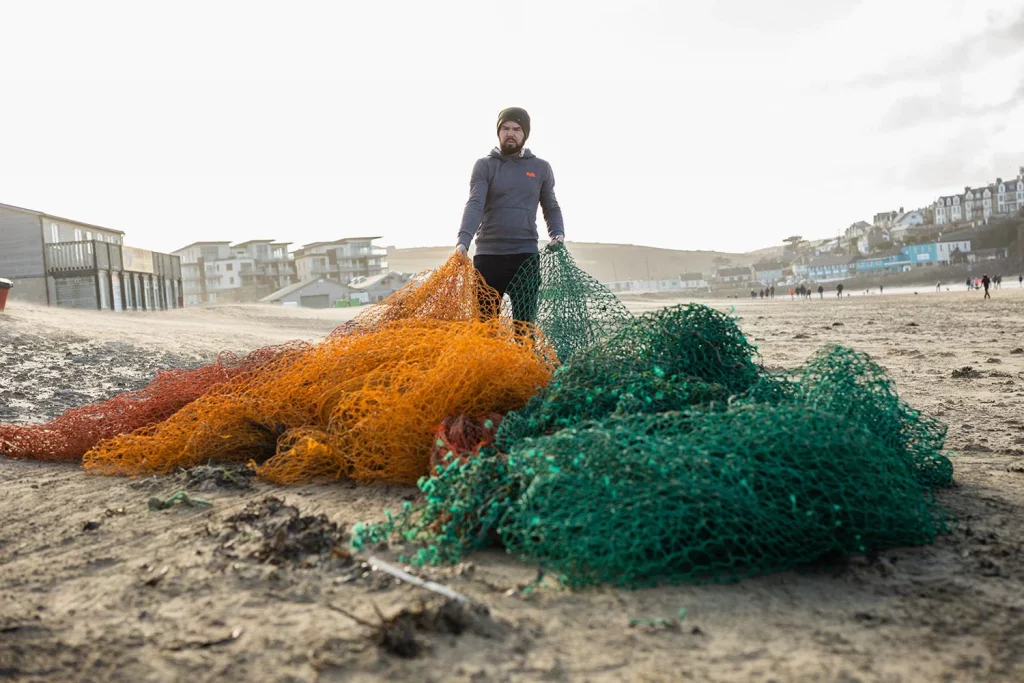Marine fisheries contribute to plastic pollution primarily through the abandoned, lost, or discarded fishing gear, such as nets, lines, ropes, and traps.
“Turning the super strong plastic waste into pellets that can be transformed into durable products.” [Daily Mail reporting: Waterhaul – Recycled, Sustainable Sunglasses & Ocean Plastic Products]
.
A couple of years ago, the Exmouth-based Joanna Toole Foundation put together the excellent Ghost Gear Solutions Award grant 2020
The Joanna Toole Annual Ghost Gear Solutions Award is an award given to the most deserving project that submitted compelling strategies to tackle abandoned, lost and discarded fishing gear (ALDFG), also known as ghost gear.
Ghost gear is one of the biggest threats to animals in our oceans. An estimated 640,000 tons of ghost gear is left in our oceans each year – more than one ton every minute. Ghost gear is, by far, the deadliest form of marine debris as it is four times more likely to impact on marine life through entanglement than all other forms of marine debris combined. Every year, more than 100,000 whales, dolphins, seals and turtles get caught in abandoned or lost fishing nets, lines and traps. Moreover, there is an increasing consensus that ghost gear is directly responsible for a 10 percent decline in fish stock levels globally. Made mostly of durable modern plastics, ghost gear can take up to 600 years to break down in the marine environment.
In fact, what ghost gear really amounts to is Plastic Pollution:
- Marine fisheries contribute to plastic pollution primarily through the abandoned, lost, or discarded fishing gear, such as nets, lines, ropes, and traps used to catch 2-3 trillion fish and other aquatic animals each year.
- Ghost gear can subsist for hundreds of years, continuously harming animals, our shared habitats, coastal communities’ livelihoods, and our health.
- To prevent further harm to the environment, animals, livelihoods, and food safety and security, several measures combatting ghost gear should be implemented, including mandatory marking of fishing gear.
And its very much in the news of late, with green groups highlighting “10 Shocking Things You Didn’t Know About Ghost Gear” and the Nature journal looking at mitigating ghost fishing. It’s now very much a mainstream issue, with today’s Mail looking at how two British surfers have managed to turn Covid masks and fishing nets found on Cornwall’s beaches into sunglasses:
Harry Dennis and Gavin Parker, from Newquay, Cornwall, decided to act after seeing local beaches littered with plastic fishing ropes, nets, pots and traps. The washed-up waste, called ‘ghost gear’, was just the tip of the iceberg – as fishermen were chucking masses more obsolete kit into the sea, where it will continue to kill marine life for hundreds of years.
To tackle the problem, the pair took a huge gamble – quitting their jobs and ploughing their savings into turning the super strong plastic waste into pellets that they transformed in sunglasses frames, which they now sell for £61.85 to £95 a pair. Now the two young marine conservationists-turned-entrepreneurs are aiming even higher, as they seek Dragons’ Den-style investors for the first time so they can collect discarded fishing gear across Britain and even into Africa.
To finish, there are some great photos on their business website Waterhaul – Recycled, Sustainable Sunglasses & Ocean Plastic Products, including:

Read this very inspiring piece Net Missions: Perranporth, Cornwall– Waterhaul from Paul David Smith, pictured.
…